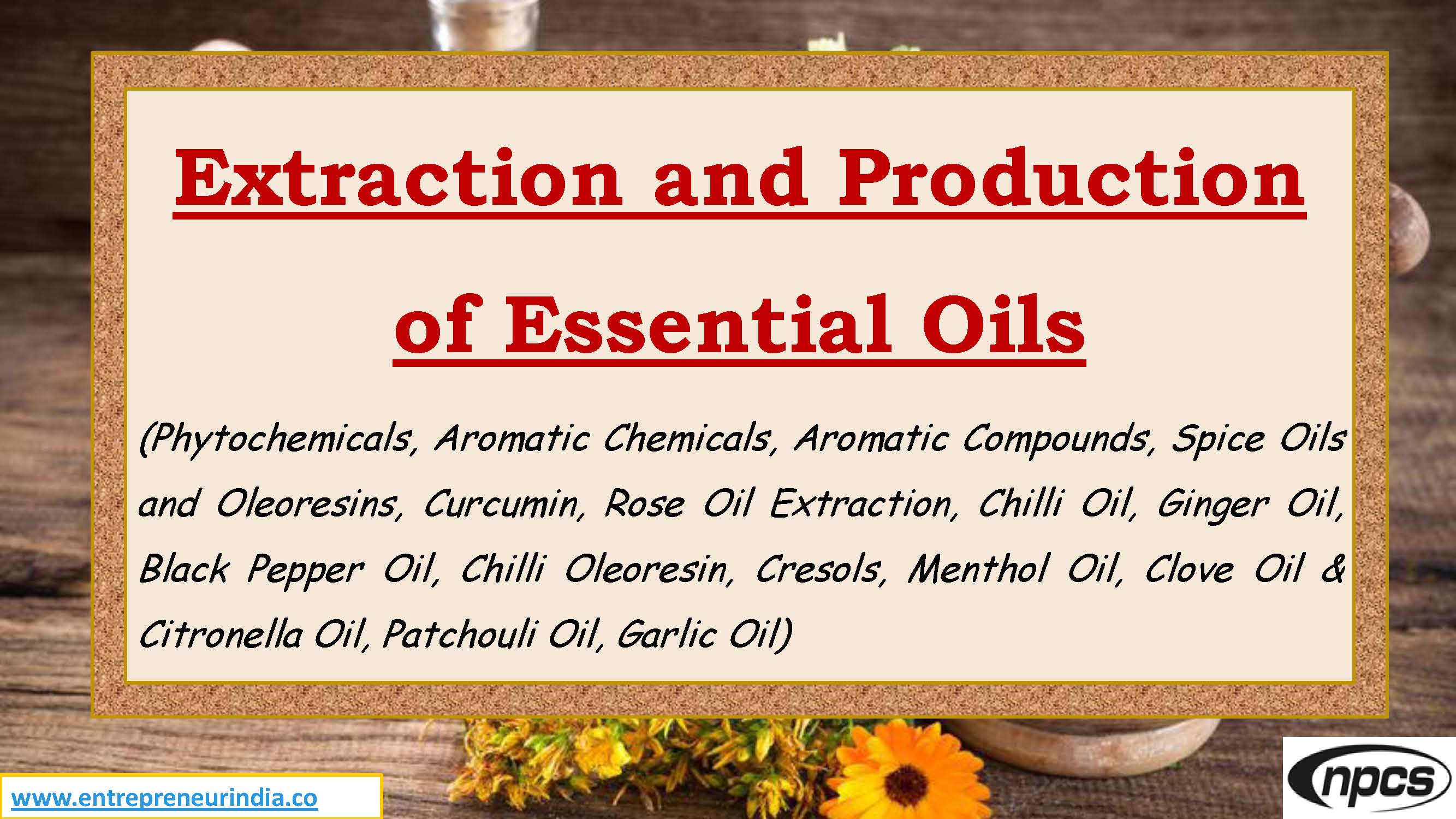
India’s herbal wealth and agricultural diversity make it a global hotspot for natural extract businesses. With increasing consumer awareness around wellness, skincare, aromatherapy, and clean-label products, essential oils and oleoresins have carved a profitable niche. Entrepreneurs today are leveraging India’s biodiversity and cost-effective labor to tap into this lucrative space. Moreover, growing global demand and the shift toward natural ingredients provide long-term opportunities. Starting an essential oils extraction business can be both impactful and income-generating—whether you aim for domestic distribution or global exports.
Contents
Essential Oils & Oleoresins Extraction | Profitable Business
Essential oils are natural, volatile extracts obtained from various parts of aromatic plants—leaves, bark, flowers, seeds, or peels—using steam or hydro-distillation. On the other hand, oleoresins are semi-solid extracts made from spices or herbs using solvent extraction. While essential oils are used in perfumes, cosmetics, and wellness, oleoresins are popular in the food, flavoring, and pharmaceutical industries. Combining both products can expand your market and increase profitability.
See Also :Small Manufacturing Business
Many commonly found Indian crops like lemongrass, eucalyptus, citronella, tulsi, and peppermint are ideal for essential oils extraction. For oleoresins, high-yield crops include turmeric, ginger, paprika, clove, and black pepper. These crops are easily grown or sourced from local farmers, making raw material procurement smooth and cost-effective.
The most common method for extracting essential oils is steam distillation. It involves passing steam through raw plant material to release and collect the oil. For oleoresins, a food-grade solvent like ethanol or hexane is used to extract flavor-rich compounds from spices. This process is followed by filtration, solvent recovery, and packaging. A small or medium-sized setup can be managed with compact distillation units, boilers, separators, and stainless-steel tanks. Moreover, automated systems reduce manpower while increasing yield and consistency.
A basic essential oils extraction unit can start with an investment of ?5–8 lakhs. This includes the cost of a steam distillation unit, boiler, condenser, and storage vessels. A combined unit with oleoresin capabilities may require ?15–25 lakhs, depending on scale and automation. Monthly profits can range from ?50,000 to ?3 lakhs, especially if targeting high-demand segments like cosmetics, herbal teas, and therapeutic blends.
Quality Assurance
Maintaining high quality is essential in this business. Essential oil purity depends on parameters like refractive index, density, and aroma. For oleoresins, ensure no residual solvents remain and that flavor intensity matches the source crop. You may need a basic lab for quality testing or can collaborate with third-party labs to ensure compliance. Moreover, investing in clean processing spaces and hygienic packaging boosts brand trust.
Packaging & Storage
The final product must be stored in dark, airtight glass bottles to preserve aroma and prevent oxidation. For bulk supply, HDPE drums or stainless-steel tanks are used. Labeling should include botanical names, batch numbers, and safety guidelines. Moreover, temperature-controlled storage improves shelf life, especially for sensitive oils like lavender or orange peel.
Regulatory Approvals
To run this business legally in India, you’ll need:
-
Udyam MSME registration
-
GST registration
-
Pollution Control Board clearance
-
FSSAI license (if selling food-grade oleoresins)
-
IEC code for exports
While not mandatory, certifications like ISO, HACCP, and GMP improve brand value and open more B2B opportunities. Moreover, if you plan to export, registration with APEDA and compliance with foreign quality standards is advisable.
Market & Sales Strategy
Your target buyers include:
-
Aromatherapy brands
-
Herbal cosmetic manufacturers
-
Food flavoring companies
-
Ayurvedic wellness brands
-
Exporters and distributors
You can also sell directly via your own website, farmer markets, or online platforms like Amazon, Etsy, and Flipkart. Moreover, private labeling opportunities allow you to supply customized blends to other businesses.
India’s government offers several support schemes for agro-based and herbal extract businesses. For instance, PMEGP offers subsidized loans for rural manufacturing units. The Ministry of AYUSH supports herbal and traditional product entrepreneurs. State-level industries also provide land, power, and marketing support under MSME policies. Moreover, Skill India can help train staff in processing and handling.
The global market for essential oils is expected to reach over $15 billion by 2028, driven by rising demand for clean-label cosmetics, stress-relief solutions, and plant-based medicines. India is already a leading producer and exporter of oils like peppermint, eucalyptus, lemongrass, and ginger. Moreover, niche oils like tulsi and palmarosa have seen rising global demand in recent years.
Read Also :Small Business Ideas
Conclusion
Starting an essential oils and oleoresins business combines the benefits of a nature-based venture with strong commercial returns. With moderate investment and a clear market strategy, you can build a high-margin business that serves both domestic and international markets. Moreover, growing demand for natural products, government support, and sustainable practices make this one of the most rewarding sectors today. Whether you’re a small farmer group, entrepreneur, or investor—this is the right time to tap into the power of natural extracts.















